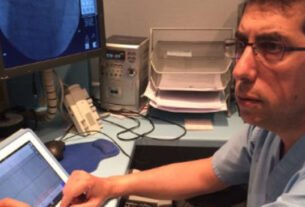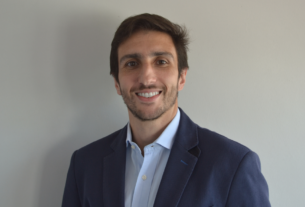Carlos Cendra studied economic and business sciences and started work at a technology consultancy in Spain, where he was involved in a consultancy project helping to redefine Telefónica’s entire commercial strategy. He went on to work on a technological renovation project in hospitals that led him to renew the entire technological portfolio at 82 Spanish hospitals. In 1997 he decided to dedicate himself exclusively to consultancy in the healthcare field and continued to do so for the next 14 years. In 2007, as part of a healthcare consultancy team, he joined up with Telefónica again as an external consultant and after four years took part in the eHealth Telefónica project, ending up joining the Company.
“My history with Telefónica goes back a long way. I have a wide-ranging vision of healthcare with regards to technology, strategic technological planning, implementation of electronic health records, hospital computerization and telemedicine projects,” says Cendra, explaining that although he did much of his work in Spain, he was always involved in Latin America.
We wanted to find out a little more:
EHealth Reporter Latin America: Do you believe that Telefónica has managed to position itself as a key player in the industry?
Carlos Cendra: Essentially, Telefónica has identified that there is an opportunity to position itself as a key player in the healthcare field. And so the company has decided to make a significant investment in the health sector.
EHRLA: What does that investment consist of?
CC: The first thing we did was to analyze the market and identify the areas of opportunity where Teléfonica, because of its capabilities, can offer differentiated solutions and become a player in the healthcare sector. So for the past couple of years, or year and a half, we have started to implement this strategy.
EHRLA: What is Telefónica Digital’s strategy for healthcare?
CC: We are concentrating on four lines of solutions in the eHealth environment with a clear focus on the countries where we want to start work to begin developing this strategy. The countries on which we are focusing are Spain, the United Kingdom, Brazil, Argentina and Chile.
EHRLA: Why did you choose these countries?
CC: Fundamentally because of the maturity of the health sector in those countries and also because of Telefónica’s capacity in each of those markets. Our idea is to focus on them and release the products we have been working on. Some of these solutions have been developed quite extensively in some markets and so we’re bringing them to other countries. In other cases we are starting practically from zero and working simultaneously in each country.
EHRLA: Has every line of business already been tested in Spain?
CC: Not always; although it’s true that we have solutions we provide in Spain, the great majority are solutions designed especially for each market.
EHRLA: What’s on your schedule when you visit Argentina?
CC: Basically, I come to do two things. Firstly, to study all the advances made by the local division relating to the strategic plan in Argentina. With regard to the strategic plan 2013-2015 in the eHealth field, we are currently assessing the needs of resource structures, sharing our vision with the country and completing this plan. Secondly I hold meetings with clients with whom we’ve been talking for a few months now and we are also seeking new clients with whom we can start work in this line of business. Starting out with a new client involves some extremely important conversations.
EHRLA: What businesses and partnerships are confirmed?
CC: Galeno (the pre-paid healthcare company) has been a Telefónica client for some time, and we’re working in the medical imaging line. There is also a reality: there are many things that public and private organizations must do in terms of eHealth and so we also have a clear idea of where we can offer a differentiated solution and where we can’t. There are areas where we know that our capacities differentiate us, where the solutions can be industrialized.
EHRLA: Such as?
CC: We are never going to start out on projects developing administration platforms or solutions because the developers already exist for that. We know that we are new to the field of remote service management, but also where we can industrialize millions of users. We are good at managing many different appointments through different numbers of channels for the patient and that we can bring remote care to thousands of patients. We know how to manage devices and provide services in mobile devices in remote areas. But there are lines of business in which we aren’t going to get involved. We aren’t project specialists but, in contrast we are excellent at industrializing services. So we can industrialize a medical imaging service because we have all the necessary data center and communications capacity. But, at least for the moment, we aren’t interested in setting up a hospital information service in a hospital that needs to integrate and develop its services; other people have those skills. What we can do is complement that development with our services.
EHRLA: Can you provide an example?
CC: The case of Galeno, who have four thousand patients with chronic illnesses who need to be monitored. The ability to manage this service, for example providing certain remote care devices to the patient’s home, monitoring the patient, and providing support if the device isn’t working. That can’t be done by a healthcare organization or a software company. It is operators who are used to managing services for millions of users or providing service support on an industrialized scale.
EHRLA: What strategies are you implementing to promote these services?
CC: We are talking to different clients from different countries who recognize the differential value we can offer as a company used to managing services on a massive scale, for the new model of healthcare based on the application of ICTs. We, the operators, have a significant operating capacity that makes us distinct. The use of ICTs began with a first worldwide wave of eHealth understood as the computerization of hospitals. But now we have moved on a step further: healthcare is progressing towards a model that is taking shape in the healthcare sector, one that is moving towards the patient. That’s why it will be necessary to manage and monitor thousands of users with thousands of devices and provide support with connectivity and services. This is where Telefónica can make its differential value count.
Related stories:
Appointment Scheduling, Remote Care, Tele-Care and Management of Patients with Chronic Diseases
Can We Prevent the Collapse of Healthcare Systems?


